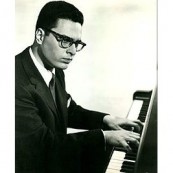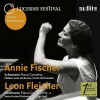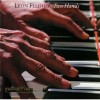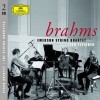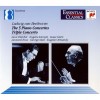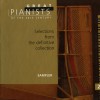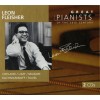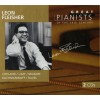| Voice/Instrument: | Pianoforte |
Biography
Fleisher was born in San Francisco, where he started studying the piano at age four. He made his public debut at age eight and played with the New York Philharmonic under Pierre Monteux at 16; Monteux famously called him "the pianistic find of the century." He became one of the few child prodigies to be accepted for study with Artur Schnabel and also studied with Maria Curcio.[1][2] Fleisher was linked via Schnabel to a tradition that descended directly from Beethoven himself, handed down through Carl Czerny and Theodor Leschetizky.
In the 1950s, Fleisher signed an exclusive recording contract with Columbia Masterworks. He is particularly well known for his interpretations of the piano concerti of Brahms and Beethoven, which he recorded with George Szell and the Cleveland Orchestra. They also recorded Mozart's Piano Concerto No. 25, the Grieg and Schumann piano concertos, Franck's Symphonic Variations, and Rachmaninoff's Rhapsody on a Theme of Paganini.
In the 1960s, Fleisher lost the use of his right hand, due to a condition that was eventually diagnosed as focal dystonia. Fleisher commenced performing and recording the left-handed repertoire while searching for a cure for his condition. In addition, he undertook conducting during this time, serving at one time as Music Director of the Annapolis Symphony Orchestra in Maryland. In the early 21st century, Fleisher regained the use of his right hand through a combination of Rolfing and botox injections.
In 2004, Vanguard Classics released Leon Fleisher's first "two-handed" recording since the 1960s, entitled "Two Hands", to critical acclaim. Two Hands is also the title of a short documentary on Fleisher by Nathaniel Kahn which was nominated for an Academy Award for best short subject on January 23, 2007. Fleisher received the 2007 Kennedy Center Honors. Kennedy Center Chairman Stephen A. Schwarzman described him as "a consummate musician whose career is a moving testament to the life-affirming power of art."
Fleisher's musical interests extend beyond the central German Romantic repertory. The American composer William Bolcom composed his Concerto for Two Pianos, Left Hand for Fleisher and his close friend Gary Graffman, who has also suffered from debilitating problems with his right hand. It received its first performance in Baltimore in April 1996. The concerto is constructed in such a way that it can be performed in one of three ways, with either piano part alone with reduced orchestra, or with both piano parts and the two reduced orchestras combined into a full orchestra.
In 2004, Leon Fleisher played the world premiere of Paul Hindemith's Klaviermusik (Piano Concerto for the Left Hand), Op. 29, with the Berlin Philharmonic. This work was written in 1923, for Paul Wittgenstein, but he did not like it and refused to play it. However, he had sole performing rights, and he kept the score, not allowing any other pianists to play it. The manuscript was discovered among his papers after the death of his widow in 2002. On October 2, 2005, Fleisher played the American premiere of the work, with the San Francisco Symphony under Herbert Blomstedt.[3]
He has continued to be involved in music, both conducting and teaching at the Peabody Conservatory of Music, the Curtis Institute of Music, and the Royal Conservatory of Music in Toronto; he is also closely associated with the Tanglewood Music Center. Among others, Fleisher has taught Orit Wolf, Jonathan Biss, Yefim Bronfman, Phillip Bush, Naida Cole, Enrico Elisi, Enrique Graf, Hélène Grimaud, Hao Huang, Kevin Kenner, Louis Lortie, Wonny Song, André Watts, Jack Winerock, and Daniel Wnukowski.
His memoir, My Nine Lives, co-written with the Washington Post music critic Anne Midgette, appeared in November, 2010.

